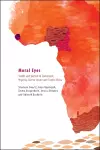
Moral eyes
5 authors - Paperback
£21.95
Sharlene Swartz is South African, a deputy executive director at the Human Sciences Research Council (HSRC) in South Africa, an honorary professor of philosophy at the University of Fort Hare, and an adjunct associate professor of sociology at the University of Cape Town (UCT). She holds undergraduate degrees from the University of the Witwatersrand and the University of Zululand, a master's degree from Harvard University and a PhD from the University of Cambridge. Her areas of expertise are the just inclusion of young people in a transforming society and the interpersonal and communal notions of restitution. Her current research follows these focal points. Her work is characterised by a focus on Southern theory, emancipatory methodologies and critical race theory. Sharlene has authored nine books, including Another Country: Everyday Social Restitution (2016); Ikasi: The Moral Ecology of South Africa’s Township Youth (2009); Teenage Tata: Voices of Young South African Fathers (2009); Youth Citizenship and the Politics of Belonging (2013); and Studying While Black: Race, Education and Emancipation in South African Universities (2018).
Anye Nyamnjoh is Cameroonian; he works at the HSRC as a researcher. Previously he lectured part-time in the Department of Political Studies and Philosophy at UCT. He taught on the politics of Africa and the Global South and on business ethics. He holds an undergraduate and a master’s degree from UCT. His expertise is social and political philosophy; his current research focuses on social attitudes and restitution, interrogating South African attitudes towards social transformation. Anye has co-authored two journal articles on these topics, soon to be published. He also wrote a journal article called ‘The phenomenology of Rhodes Must Fall: Student activism and the experience of alienation at the University of Cape Town’, which was published in Strategic Review for Southern Africa (2017). His doctoral study will engage with youth movements and decoloniality in South Africa.
Emma Arogundade is South African by birth. However, she is connected to Nigeria by marriage and motherhood. She is a PhD candidate in the sociology department at UCT, where she is exploring issues of morality, racialised identity and restitution in South Africa. She holds an MPhil in critical diversity studies from UCT. Emma has lectured extensively on diversity, race, class and gender, and in community development, at UCT and at the School for International Training. She assisted with editing three volumes of the Celebrating Africa series at UCT and has co-authored two journal articles and two book chapters. Her work centres on identities, feminisms and narrative theory. She uses these frameworks to explore issues such as community development, motherhood and moral identities, as well as the more complex intersection of privilege, oppression and forms of resistance.
Jessica Breakey is South African and a MPhil student in the sociology department at the University of Cambridge. She completed her MA by dissertation at the Wits Institute for Social and Economic Research. That study focused on the symbolic, theoretical and physical manifestations of fire in the 2015–2016 South African student movements. She holds a BA Hons in African Studies and a BA, both from UCT. Jessica has received several scholarships: she is a Mandela, Rhodes, Oppenheimer and Chevening Scholar, who strives to be a passionate and relevant intellectual. She hopes, above all else, that she will one day see a South Africa that is fair and good. Her contribution to this book is her first published work.
Abioseh Bockarie is a Sierra Leonean who is currently a German Academic Exchange (DAAD) scholar. She is preparing to engage in PhD research in development studies at the South African–German Centre for Development Research (SA-GER CDR) at the University of the Western Cape (UWC) and Ruhr University, Bochum. She holds a master’s degree in development studies from UWC and an undergraduate degree from UCT. Her expertise and current research involve assessing the structural issues that limit the economic capabilities of women living in South Africa's informal settlements.